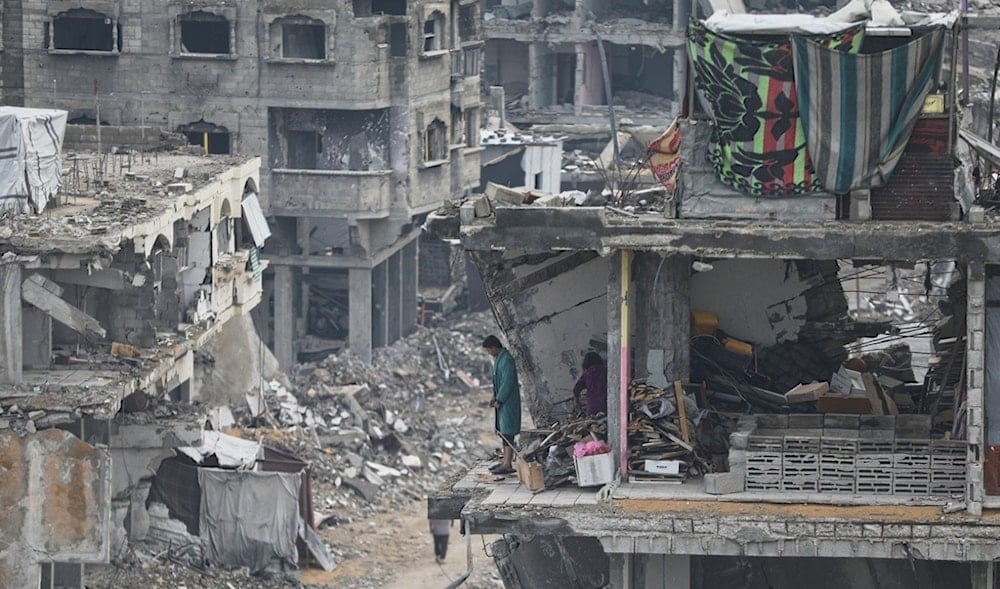US-led UN resolution 'inconsistent with national will': Pal. factions
Palestinian factions reject the US-backed UN resolution on Gaza, warning against international forces and any imposed arrangements undermining national sovereignty.
-

A man and a woman stand in their damaged apartment, surrounded by the the rubble of neighboring residences, all devastated by Israeli bombardments, in Gaza City, Friday Nov.14, 2025 (AP)
Palestinian forces and factions reaffirmed on Tuesday their firm rejection of the US-driven scheme on Gaza, adopted by the UN Security Council, stating it blatantly violates international principles and attempts to enforce arrangements inconsistent with the Palestinian national will.
In their statement, the factions warned that any international force deployed in Gaza under the proposed framework would act as a form of guardianship or imposed administration, infringing upon the Palestinian people’s right to self-determination and the management of their internal affairs.
They also asserted that the proposal amounts to international complicity in the genocide carried out by the occupation against the Strip. It ignores the ongoing violence in the occupied West Bank, including al-Quds, where settler terrorism and gradual annexation continue, overlooking the urgent need for international protection against these aggressions.
The factions added that the resolution links the withdrawal of the occupation and the cessation of war to the conditions of the Israeli occupation, placing restrictions on reconstruction and humanitarian aid in accordance with its will. They stressed that armed resistance is a legitimate right in the face of ongoing genocide and the absence of international protection.
Furthermore, they warned that transforming the international force into a security tool coordinating with the occupation would render the concept of protection meaningless and turn it into a new form of aggression against the Palestinian people.
Points of emphasis
Reaffirming their rejection of the UN Security Council resolution, the Palestinian forces and factions outlined eight key points:
1. Adherence to Inalienable Rights
Commitment to the fundamental rights of the Palestinian people, especially the right of return, self-determination, the end of the occupation, and the establishment of an independent state with al-Quds as its capital.
2. Rejection of Undermining Arrangements
Refusal of any international arrangements that undermine Palestinian rights and sovereignty. Any international protection role must be strictly limited to shielding civilians from aggression.
3. UN-Led Force with Palestinian Coordination
Any international force must operate solely under the authority of the United Nations and in coordination with Palestinian institutions, without any involvement from the occupation. The factions categorically rejected the presence of any foreign military force in Gaza.
4. Rejection of Resistance Labeling and Disarmament
Condemnation of efforts to label Palestinian resistance as “terrorism” and any discussion of Palestinian weapons outside their national and legal context. These arms are seen as essential for a people under occupation.
5. Palestinian-Led Reconstruction and Aid
Emphasis on the need for reconstruction and humanitarian aid to be led and managed by Palestinians in coordination with the United Nations.
6. Condemnation of Impunity for the Occupation
Warning that the resolution lacks mechanisms to hold the occupation accountable, despite its role in the starvation of the population, deprivation of supplies, and its control over all crossings, including the Rafah crossing.
7. Support for Arab-Islamic Proposals
Affirmation that the plan agreed upon at the Arab and Islamic levels, specifically the Egyptian proposal for establishing an independent national administration in Gaza and launching early recovery, is a more practical and nationally acceptable alternative.
8. Call for Binding Guarantees and Action
A call on mediators to ensure the occupation does not exploit the resolution to escape responsibility. The factions warned that without binding guarantees, the resolution could provide cover for a renewed genocide in the Gaza Strip.
Final position
The Palestinian factions concluded by declaring that any international arrangements failing to respect the national will, end the war, or guarantee withdrawal and reconstruction are non-binding to the Palestinian people. They emphasized that a people who have endured immense suffering and sacrifice will not yield to any attempt to erase or liquidate their national cause.
The resolution, proposed by the US and adopted late Monday with 13 votes in favor, includes provisions for deploying an international force in Gaza and disarming the Palestinian resistance, both of which have been categorically rejected by Palestinian factions.
Resolution 2803
The resolution, officially adopted on Monday as UNSC Resolution 2803, authorizes the creation of a “Board of Peace” (BoP) and an International Stabilization Force (ISF) to oversee Gaza’s governance and security until at least the end of 2027. The BoP will have sweeping oversight powers, while the ISF is tasked with securing borders, monitoring ceasefires, and facilitating aid.
The plan stems from a US-brokered agreement involving "Israel" and includes provisions for rebuilding Gaza and replacing the current governance structure without Palestinian resistance factions.
Nations, including Russia and China, criticized the resolution as vague and overly dominated by Washington’s interests. Rights groups and former UN officials have condemned the resolution as undermining Palestinian self-rule and violating international legal norms by imposing external governance structures without local participation.
Read more: Nebenzia: US, allies fully responsible for Gaza plan outcome

 5 Min Read
5 Min Read










